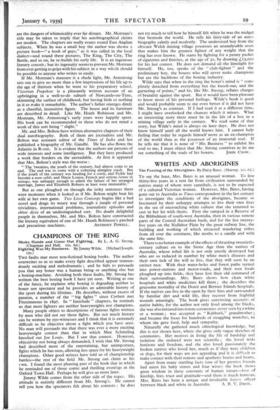CHAMPIONS OF THE RING
Shake Hands and Come Out Fighting. By L. A. G. Strong. (Chapman and Hall. los. 6d.)
Fighting Was My Business. By Jimmy Wilde. (Michael Joseph. t5s.) Two faults mar most non-fictional boxing books. The author overwrites so as to make every fight described appear tremen- dously exciting and melodramatic ; and he fails to persuade you that any boxer was a human being or anything else but a boxing-machine. Avoiding both these faults, Mr. Strong has written the best boxing book I have yet seen. Writing as one of the fancy, he explains why boxing is degrading neither to boxer nor spectator and he provides an admirable history of the sport during his lifetime. He describes, without excess of passion, a number of the " big fights " since Corbett met Fitzsimmons in 1897. In " Interlude " chapters, he reminds us that most fighters are neither heavyweights nor champions.
Many people object to descriptions of famous fights written by men who did not see those fights. But not much history can be written by eye-witnesses and I think that it is extremely difficult to be objective about a fight which you have seen. No man will persuade me that there was ever a more exciting heavyweight contest than that in which Max Schmeling knocked out Joe Louis. But I saw that contest. However, objectivity not being always demanded, I wish that Mr. Strong had described more of the entertaining, but unimportant, fights which he has seen, allowing less space for his heavyweight champions. Other good writers have told us of championship battles—the rest of the field Mr. Strong can claim as his cwn. I found the most pleasing part of the book that in which he reminded me of those comic and thrilling evenings at the Oxford Town Hall. Perhaps he will give us more later.
Jimmy Wilde comes from the other side of the ropes. His attitude is entirely different from Mr. Strong's. He cannot tell you how the spectators felt about his contests : he does not try much to tell how he himself felt when he was the midget that bestrode the world. He tells his fairy-tale of an auto- biography calmly and modestly. The undersized boy from the obscure Welsh mining village possesses an unanalysable asset that makes him the greatest fighter of any weight that the ring has ever known. He starts by fighting for a penny packet of cigarettes and finishes, at the age of 31, by drawing kx3,000 for his last contest. He does not demand all the limelight for himself. He, too, speaks of the " club-fighter " and the preliminary boy, the boxers who will never make champions but are the backbone of the boxing industry.
Wilde says that when in the ring the boxer's mind is " com- pletely detached from everything but the knock-out, and the garnering of points," and he, like Mr. Strong, refutes charges of brutality against the sport. But it would have been pleasant to know more of his personal feelings. Wilde's book is good and would probably seem to me even better if it did not have Mr. Strong's as contrast. If I had read it at a different time, I might have overlooked the chances which it misses. What an interesting story there must be in the life of a boy in a mining village early in the century. We read some of that story, but Wilde's mind is always on later days. He does not know himself until all the world knows him. I cannot help feeling that today he regards himself more as an ex-champion of the world than as the possessor of an immortal soul. If he tells me that it is none of " His Business " to exhibit his soul to me, I must object that Mr. Strong contrives to let me
' see something of the souls of his boxers. JoHN CRovkr.










































 Previous page
Previous page